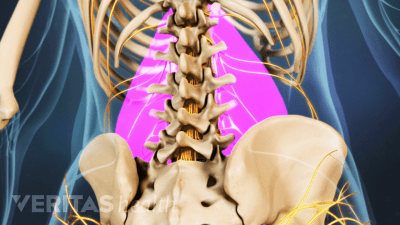Lower back strain is acute pain caused by damage to the muscles and ligaments of the back. It is often referred to as a pulled muscle. The back is supported by a large, complex group of muscles that hold up the spine, including the extensor, flexor, and oblique muscles. The soft tissues surrounding the spine enable bending forward, lifting, arching, and twisting movements.
Lumbar muscle strain occurs when a back muscle is over-stretched or torn, which damages the muscle fibers. When one of the ligaments in the back tears, it is referred to as a sprain.
Movements that put stress on the back can result in pulled muscles. For example, lifting a heavy object, twisting while lifting, falling, or some sports could cause lumbar muscle strain.
Symptoms of lumbar muscle strain include sudden onset of pain, localized pain that does not radiate into the leg, and tenderness in the lower back.
Muscle strain can be accompanied by muscle spasms, as the body tries to stabilize the injury.
Acute pain from a lower back strain can resolve in a short amount of time, but low levels of pain or flare-ups can continue for weeks or months after the initial injury. After two weeks, back muscles can atrophy from lack of use and cause more pain.
There are many treatment options for lower back muscle strain, including exercise, which will prevent atrophy.
Recommended for You







